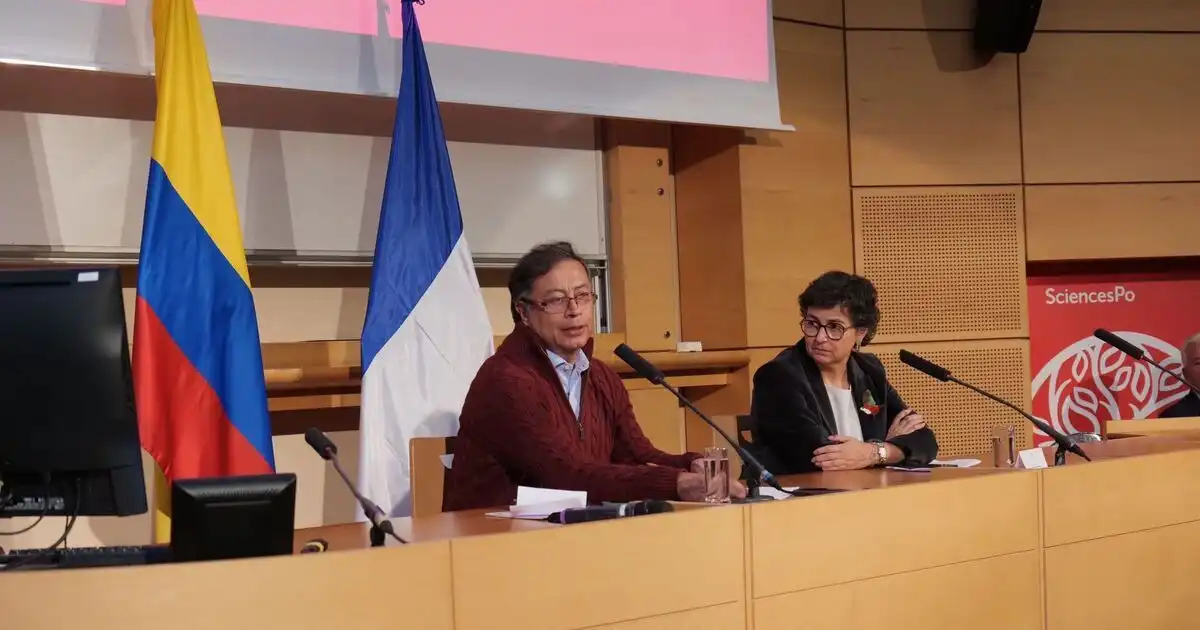Home>A world in turmoil: an analysis by Gustavo Petro, President of Colombia
18.11.2022
A world in turmoil: an analysis by Gustavo Petro, President of Colombia
The President of the Republic of Colombia was invited by Sciences Po's Paris School of International Affairs (PSIA) on 9 November 2022 for a lecture moderated by Arancha González, Dean of the School. Elected in June as head of his country, a politician but also an economist, Gustavo Petro gave a powerful speech to the students about his critical position towards our current capitalist system, the difficulty to find solutions and the tensions that will arise in our modern world that is in turmoil due to the climate crisis.
Capitalism, an economic and climatic failure?
Gustavo Petro, first left-field elected president of Colombia, expressed pretty clearly his critical position towards capitalism: “the crisis behind climate crisis is the economic myth that is capitalism”. A myth considering that “if you leave the market to work freely, profits will be maxified”. The result is astounding, “we are about to extinguish ourselves”. This theory could be more ideological than scientific, and all our economic system might have been founded on this idea.
At its origin, capitalism was between “human beings and not things”, it organised social relations and allowed the organisation of industrial production. Labour force was provided in exchange for a salary. PSIA guest speaker sees the concept of mass production and “infinite progress” as the two factors that will drive the model to an inevitable end.
“There cannot be endless progress on our planet.”
Towards fairer solutions?
The former Mayor of Bogota went on underlining the uneasy task of thinking political alternatives in our modern world. He cast a rather pessimistic look on major international initiatives such as the COP. He reckoned that the COP, instead of being a political event, has become a “technocracy”, and “as all technocracies, it is conservative”. To this leader from South America, the fact that the only solution offered by the UN to countries like Columbia to fight the climate crisis is a “pathway of indebtment" instead of “contributions from the developed countries” which are at the root of the problem, is “not serious”.
A major constraint is that “capital and markets are governing politicians" from the most polluting countries, so how could they take the necessary steps? A second constraint is the goal of these countries to maintain an “infinite progress of wealth”. The goal should not be to “change the technology to keep our level of living”, a drastic mentality change needs to take place.
“Tomorrow's wealth shouldn't be accumulating or having, it should consist of existing.”
A necessary academic analysis
Last but no least, the origin of the climatic crisis being for Gustavo Petro economic and politic, its solution will be “eminently political, in the full sense of political”. It is vital to “start to search and find answers”. An academic analysis through social sciences such as economy and politics, just like the research projects currently led by Sciences Po, needs to happen to tackle this challenge that is “not a trivial issue” and that could endanger our survival.
Following the steps of Bruno Latour, and the ideas he shared during Sciences Po's 150th anniversary on 16 September 2022, Gustavo Petro hopes that social sciences and natural sciences will be able to dialog in order to find fair and efficient solutions. In a society where “capitalism is making choices against humans”, tensions are bound to rise if humans do not “go against capital and profitability”.

